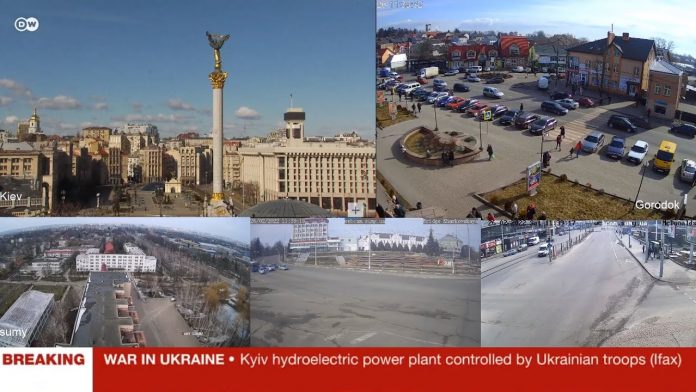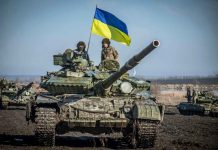Amid the ongoing Russian full-scale Ukrainians take it to the polls via their smartphones to set the record straight on the names of objects in Kyiv. Although results are somewhat conflicting and imperfect, this is a wake of a new era for the capital of Ukraine
In Ukraine and abroad there has been a widespread belief that when Russian forces invaded Ukraine in 2014 Russia had a limited aim of stalling Ukrainian crawl towards European integration. It appears now that Russia was simply probing the defenses of Europe and its allies. Having met a feeble response to its action, the Kremlin could now set to accomplish its ultimate goal – the destruction of the Ukrainian state as such by complete erasure of Ukrainian national identity.
But what is this identity? For the last 30 years discussions surrounding this question has been characterized by back-and-forth. After the Revolution of Dignity and Russian invasion in 2014 limited consensus emerged, and yet the degree of social mobilization was not sufficient. Efforts to decouple Ukrainian past and present from Russia and Soviet Union were not completely in vain but were often obstructed by red tape and culture wars.
With the advent of the full-scale invasion, it became clear that no longer such a situation could be tolerated. Imagine residing on a street named after a Soviet general while fending off an invasion orchestrated by commanders whom we taught some 40 years ago. It is a state of utmost confusion and getting it cleared out seems worth the hustle.
This is precisely the reason why the local councils of Kharkiv and Odesa, which usually are anti-reformist, backed renaming campaigns. But these two were absolutely dwarfed by what Kyiv city council set out to accomplish: an endeavor to rename 296 objects ranging from Kemerovo street (a city in Siberia) to Bestuzhev alley (Russian revolutionary from early XIX century).
These streets, alleys and squares were chosen by a commission of historians. Ukrainians proposed new names for the objects on the list. The commission reviewed proposals, choosing a few best options, but not excluding others as well. This lengthy list was then published, so that citizens of Ukraine could vote for their favorites via Kyiv mobile application.
The results of the vote are what an unrestrained democracy looks like. They are simultaneously brave, provocative and contradicting. Among the winners: princes from the tenth century, their wives, soldiers of Russo-Ukrainian war, Ukrainian towns, as well as London, Matsuo Bashō, Portugal and Umberto Eco. The members of local parliament having the final say on the renaming will now debate all these colorful options.
This instrument of digital democracy was hailed by Kyiv city council and disregarded by the commission of historians. For instance, they consider it to be false that not only residents of Kyiv, but virtually every Ukrainian participated in the poll, with a total of 6.5 million votes casted by 285 thousand individuals.
Although these numbers might appear to be gigantic, it is a neglectable share of Kyiv’s 3.5 million prewar population. Campaigning for specific options yielded mixed results. Killed civil society activists Roman Ratushnyi and Kateryna Handziuk would not receive landslide victories if not for promotion in social media. At the same time, this type of digital democracy also gives the voice to those who are best at shouting, even if their voices are coming from the fringe. Hero of Ukraine Major Lutashin, who was killed in action, lost to Andriy Melnyk. The latter was a factional leader of Ukrainian nationalist who is less known than his contemporaries Stepan Bandera and Roman Shukhevych. Bandera was prosecuted by Nazis Germany while Shukhevych led an armed struggle against them, and yet there are many ambiguities surrounding these figures. Melnyk instead chose the path of collaboration, working with the Nazis even when his followers joined the lieutenants of Bandera in German jails and firing squad ranges. In other words, Melnyk figure is less ambiguously situated in the no go zone of public memory. No wonder that not many Ukrainians know this person after all. He is mostly popular in the ethnonationalist marginal circles which utilized their mobilization capacity and voted him
Dissenting opinions were also voiced regarding other features of the renaming project. People on the left were not exactly happy that three remaining Marx streets in Kyiv were to disappear from the map. In a similar way, American Left was outraged by the University of Florida removing Karl Marx from a room name shortly after Russian tanks rolled over Ukrainian borders. Marx indeed has little to do with Russian invasion, but the invasion is not the reason why three Marx streets in Kyiv are three too many. They simply indicate that little has changed here since the fall of the Soviet Union which is no longer the case.
Others lamented the departure of Pushkin, Tolstoy and Mikhail Bulgakov. The defenders of this position tend to believe that Putin personally is responsible for the war and not the Russian nation as such. This criticism misses the point. Keeping urban objects named after Russian cultural actors reinforces their hegemonic position over their Ukrainian counterparts. For good two centuries Russian colonial machinery of violence kept Ukrainian culture in an underprivileged position. Despite these barriers, there is no shortage of globally acclaimed Ukrainian artists and thinkers who can easily fill in the cityscape for Dostoevsky and Lermontov. As with the Marx example, a Pushkin Street in the downtown of Kyiv no longer matches the power relations on the ground.
It is precisely the Russian 8-year long war against war that set the scenery for the change in power relations and then dramatically accelerated the transition on the 24th of February. In other words, Putin made one strategic mistake after another. Hastily and sometimes inconsistently, but Ukrainians had their say and now the ball is on the side of Kyiv city council. Will it rebel against some of the winners or follow through on the vote results? One way or another, but the past is not coming back.
Article is provided by representatives of Kyiv-Mohyla University who have made their services available to provide accurate, timely, on-the-ground reporting about the war in Ukraine, including nuanced localized ongoing updates on what is happening across the country, as well as commentary and analysis.




